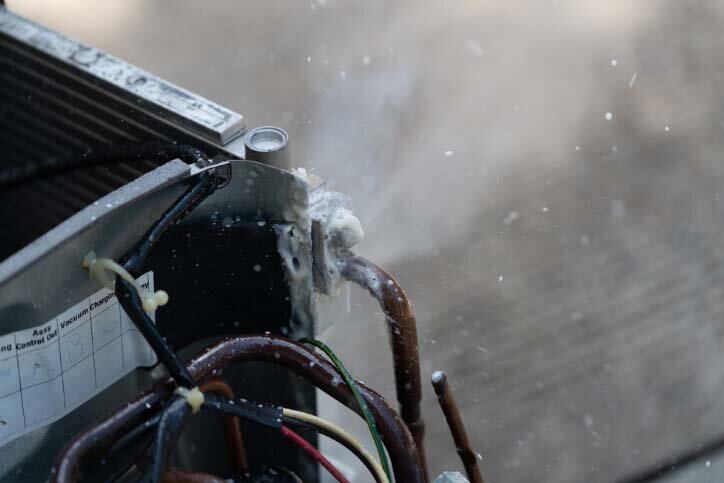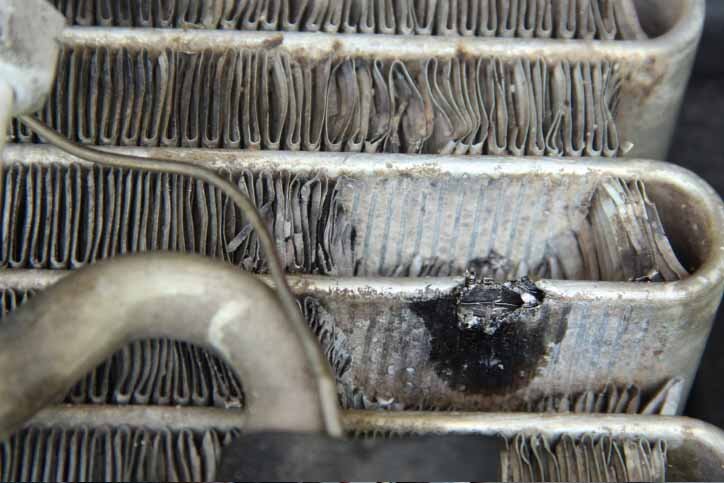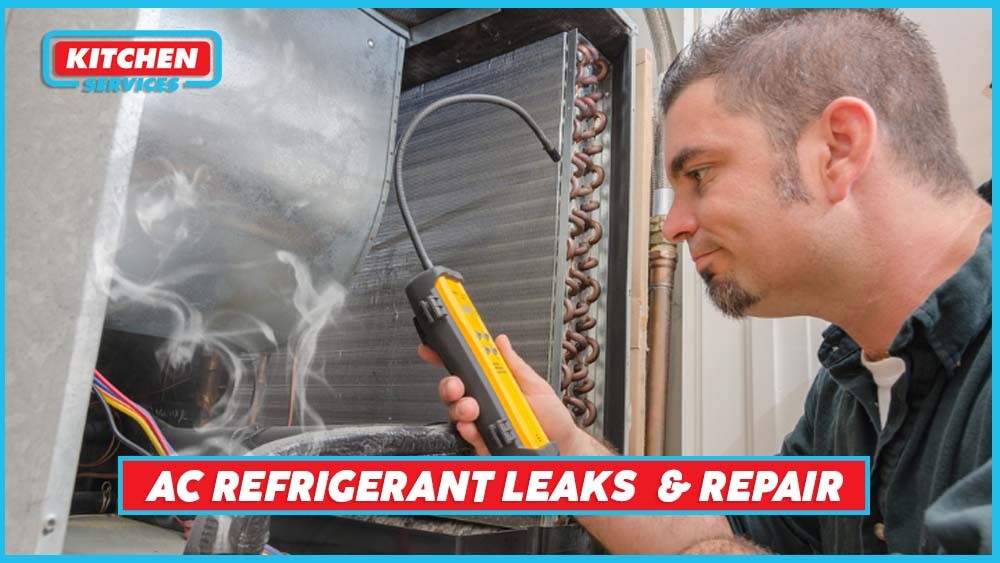Nothing is more frightening than a broken air conditioner in the middle of a hot summer. To minimize the harm that AC refrigerant leaks can cause, both households and small business owners with commercial units should be aware of the indicators. While regular HVAC maintenance can prevent it, here’s everything you need to know about AC refrigerants, including how to spot a leak and how to replace it.
What is a Freon or AC Refrigerant?
Freon is a non-combustible refrigerant that is used in commercial refrigeration systems. This Freon goes through a series of evaporation processes in order to produce cool air that may be circulated throughout your air conditioning system. Freon is used in a variety of applications, with some costing more than others depending on the product’s availability. When people say that an air conditioner needs to be recharged or replenished, they’re referring to Freon levels.
However, a lot of hazards are attached to Freon gas. Freon gas leaks can happen at the exterior compressor or inside the AC unit as the Freon Liquid is pumped in. It is advised to always consult AC installation team to avoid such hazards, in the first place.
A hissing sound near the evaporator coil or refrigerant lines could indicate a Freon leak, which can compromise the cooling process and increase utility bills. The HVAC experts will inspect your HVAC system using a leak detector to identify larger leaks and determine whether your air conditioner requires repair or replacement. Addressing the issue promptly ensures your AC system continues to provide cool air efficiently and safely.

What Are The Dangers Attached With Freon Leaks?
To begin with, the dangers of Freon exposure aren’t life-threatening as long as the exposure is kept to a minimum. Freon exposure that is prolonged and strong can be far more harmful to a person’s health.
It contains chemicals that can contaminate the air and enter your respiratory system. Freon, although being tasteless and odorless, has a significant impact on your air quality and health. Refrigeration poisoning is a dangerous illness that can include breathing difficulties, headaches, nausea and vomiting, skin and eye irritation, and coughing.
Your system may cool inefficiently as a result of refrigerant loss. It can have trouble producing enough air conditioning, preventing your home from reaching the correct temperature. This makes your unit work double hard, resulting in increased electricity bills.
What Are AC Refrigerant Freon Leak Symptoms?
At the initial stages, the below-mentioned signs will indicate that your unit is having some problems.
- Blows out Hot Air: You will notice that during the daylight hours, your unit will blow out hot air. As previously stated, the refrigerant in an air conditioner is what produces cool air. A potential indicator of an AC refrigerant leak is hot air flowing out of your HVAC system’s vents–or just air that isn’t as cool as you anticipate it to be.
- Your Unit Makes Noise: Cracks or punctures in the copper coils of the unit cause almost all refrigerant leaks. A hissing sound might be heard if refrigerant leaks out of these openings.
- Unit’s Evaporator Coils Covered in Frost: The refrigerant absorbs heat from within your home or office as it passes through the evaporator coils. Due to low refrigerant levels caused by a leak, the coils absorb less heat than usual. The humidity that naturally builds on the copper coils may freeze as a result of this.
- Sudden Increase in Electricity Bills: When an air conditioner isn’t cooling as well as it should, the natural reaction is to raise the thermostat or run the system longer. Both options can result in higher utility bills. If your bill is significantly greater than it was at the same time last year, it could indicate a refrigerant leak.
If you are experiencing any of the above air conditioning problems, call local air conditioning repair company, immediately.
What Causes Freon Leaks in Air Conditioner
Freon (or other refrigerants like R-410A) leaks in an air conditioner can result from various causes. Here are the most common reasons:

Wear and Tear
The wear and tear of your refrigerant unit can be one major source of leaks. You may see that there are some rubber seals that are present on the service valve all around the valve stems which may wear out and leak with the passage of time. The whole system that is outside can rust and cause the construction joints to rust. During the first year of your refrigerator, these types of leaks will not show and usually they end up showing later. In many cases, these leaks are relatively simple to fix and require only one professional to come and put in a new part. Other more serious cases need more major repairs done to remove rusted parts.
Pin Hole Leak
Pin and hole leak is another type of leak which is caused by “Formic”, usually, the forming acid will eat your copper tubing away. Leaks like this will happen to show up until later on. When they do show up, they will be joined by some other leaks that might be at different areas of the components and copper tubes of the system which results in a highly expensive replacement or repair. Formaldehyde forms Formic acid which forms on the coils and is common in several different products for home building. When this builds upon the tubes, it may develop Formic acid and it will also create pin-hole leaks in the copper tubes. This is the reason why manufacturers are switching to all-aluminum for their replacement coils since they are not prone to corrosion.
Formaldehyde
Formaldehyde can turn into Formic acid in the home on the AC coil. No doubt that it is very mild, nevertheless, over a 5-year period it may create pinholes in the copper tubes. This is known as Formicary corrosion. Many contractors use R-22 by the skid as a substitute. In case you know about indoor air quality, you will clearly understand that one particular contaminant in the home today is formaldehyde. Most if not all homes have some amount of formaldehyde in the indoor air, which may result in Formicary corrosion and cause Freon leaks. In case you notice a refrigerant leak, it is important to get it fixed instantly.
This type of leak can be dangerous to the environment and for you as well. State law states that all HVAC companies are required to fix refrigerant leaks and Kitchen Services is also one of those companies that is available all around a day at your service in case you face any refrigerant leak issues. Some of these refrigerants are also global warming and ozone agonists. The effectiveness of your AC system can be affected by a low charge. This may result in the AC compressors that are running above their suggested range which can result in eventually having to replace your system. Freon is also known as compressor lubrication in some cases, which may result in the compressor seizing up if it does not have enough. Consequently, detecting, and fixing AC air leaks is very crucial for you, your refrigerant system as well as the environment.
How Can I Prevent Future Freon Leaks?
Unfortunately, AC Freon leaks are a common issue in many air conditioning systems. Not only are refrigerant leaks a sign of a serious problem within your AC unit, but in high amounts, these leaks can be harmful to your health, your pets, and the environment. If left untreated, they can lead to larger issues that may require you to repair or replace your entire AC system.
Regular HVAC System Inspections
One of the most effective ways to prevent future Freon leaks is by scheduling regular inspections from professional HVAC companies. These inspections allow licensed technicians to catch early signs of damage—such as a failing evaporator coil, broken rubber seal, or worn-out valve—all of which can cause AC refrigerant to leak. Detecting these early helps avoid larger leaks, unexpected breakdowns, and skyrocketing energy bills.
Regular maintenance also ensures that the key components of your HVAC systems, like the accumulator or capillary tubes, stay in top shape. Whether your air conditioner is cooling inefficiently or not working at all, timely checks can prevent expensive repair services down the road.
At Kitchen Services, our team is available 24/7 to inspect and resolve any issues related to AC Freon leaks. With our prompt and reliable repair services, you can rest easy knowing your air conditioning system is in good hands.
Maintain Proper Refrigerant Levels
Keeping the AC refrigerant at its optimal level is crucial to the efficiency and health of your AC system. Whether the level is too high or too low, both scenarios can damage internal components and drive up your utility bills. It’s vital to remember that only professional HVAC technicians should handle or recharge refrigerant—doing it yourself can lead to more damage or safety risks.
A good sign that your refrigerant level might be low is if your air conditioner takes longer than usual to cool your home. This inefficiency, combined with increasing energy bills, often points to an underlying refrigerant issue. Regular preventative maintenance with a trusted HVAC company will help maintain your system’s performance and avoid costly problems.
Staying alert to any changes in how your AC unit operates and scheduling professional evaluations can save you money and protect your system. If you suspect a leak or just want peace of mind, contact our team today for a thorough inspection.
How to Fix Refrigerant Leak in AC?
Fixing a refrigerant leak in an AC unit requires careful diagnosis and repair to ensure the system operates efficiently. Here are the key steps involved to repair a refrigerant leak:
Identify the Source of the Leak
- Visual Inspection: Look for oil stains around the AC’s refrigerant lines, coils, or compressor. Leaks often leave oil residue.
- Electronic Leak Detector: A professional HVAC technician will use a refrigerant leak detector to pinpoint the exact location of the leak.
- Dye Test: Injecting UV dye into the refrigerant line can help locate hidden leaks when exposed to UV light.
3. Repair or Replace the Damaged Part
- Tighten Connections: If the leak is from loose fittings or connections, they can often be tightened.
- Seal Small Leaks: For small leaks, a specialized refrigerant sealant may be applied, though this is often a temporary fix.
- Replace Damaged Components: If the leak is due to corrosion or significant damage, replacing the affected parts (e.g., evaporator coil, condenser coil, or refrigerant line) is necessary.
4. Vacuum the System
- After repairs, the system must be evacuated to remove any moisture and air from the refrigerant lines. A vacuum pump is used for this process.
5. Recharge the System
- Once the leak is fixed and the system is vacuumed, recharge the AC with the correct type and amount of refrigerant (e.g., R-410A, R-22). Overcharging or undercharging can cause issues, so this step should be done carefully, typically by a licensed technician.
Conclusion
Overall, the greatest recommendation is to schedule monthly AC maintenance check-ups with your expert if you actually want to prevent the trouble of dealing with Freon leaks and their consequences.
Older AC units are more prone to refrigerant leaks, factory defects, and inefficiencies, leading to higher utility bills. Upgrading to a newer model can improve energy efficiency and reduce costs to repair. Any sort of exposure to leaking fluids can be fatal not just for your staff but also for your customers and business. That is why it is important to contact a professional HVAC technician as soon as you detect a refrigerant leak in your AC unit or air conditioning system. Investing in regular maintenance and energy-efficient models will ultimately help you save money and ensure a safe and comfortable environment.
AC Refrigerant Leaks FAQs
Are refrigerant leaks dangerous?
While typically far from fatal, a refrigerant leak can cause all sorts of unpleasant health problems. Common symptoms of refrigerant poisoning include headaches, coughing, respiratory trouble, and dizziness; it can also cause mild burns in cases of direct skin contact.
Can an AC refrigerant leaks be fixed?
As most refrigerant leaks are found at the indoor coil, an evaporator coil can be replaced to fix a leak.
What are the signs of freon poisoning from air conditioner?
- Swelling in your throat or sinuses.
- Difficulty breathing.
- Severe pain in your nose, throat, or sinuses.
- Burning sensation on your eyes, nose, ears, lips, or tongue.
What can happen if you inhale freon?
Severe lung damage may occur. Survival past 72 hours usually means the person will have a complete recovery. Sniffing Freon is extremely dangerous and can lead to long-term brain damage and sudden death.
Where are AC refrigerant leaks found?
Freon leaks are often found in the evaporator coil. The weakest areas are generally where the metal is stressed the most, the “U” joint, weld points and areas that are subject to the most vibration. Other places include the schrader valve. The same type of valve you would find on your tire to fill it with air.
How long does it take to get freon poisoning?
Freon poisoning can even be fatal after 72 hours of prolonged exposure to high amounts of the chemical.
What does freon look like?
You may see oil leaking, indicated by a buildup of dirt (oil attracts dirt) or oil in the area, but not always. The indoor coil/evaporator will build some ice on it, and it will eventually be blowing mildly cool or warm air.
Can I Recharge My AC’s Freon Without Fixing The Leak?
While it is possible to recharge your AC with Freon without fixing the leak, it is not recommended. Recharging without addressing the leak is a temporary fix, as the refrigerant will continue to escape. Additionally, leaking Freon can be harmful to the environment, and your system will lose efficiency over time. It’s best to locate and repair the leak before recharging the system to ensure long-term performance and compliance with environmental regulations.
Should I Fix The Coolant Leak or Replace My Cooling System?
Whether to fix the coolant leak or replace your cooling system depends on the severity of the leak and the age of your system. If the leak is minor and the system is relatively new, repairing the leak is usually the best option. However, if your cooling system is old, inefficient, or has multiple issues, replacing it may be more cost-effective in the long run. An HVAC technician can help assess the situation and recommend the best course of action.

